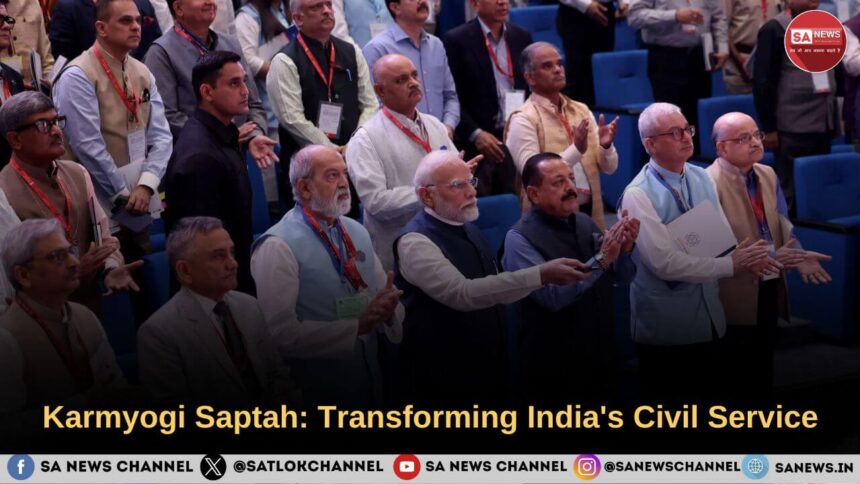Prime Minister Narendra Modi launched the Karmyogi Saptah (National Learning Week) on October 19, 2024, at Dr. Ambedkar International Centre in New Delhi. This initiative is a crucial part of Mission Karmayogi, which aims to revolutionize the civil service in India by creating a workforce that is not only rooted in Indian ethos but also has a global perspective.
The Karmyogi Saptah is a week-long event that focuses on competency-linked learning, with each civil servant required to complete at least four hours of learning. This article will delve into the significance of this initiative and how it is shaping the future of India’s civil service.
What is Karmyogi Saptah?
The Karmyogi Saptah is a national learning week launched by Prime Minister Narendra Modi to enhance the skills and competencies of government employees. It is a part of Mission Karmayogi, which aims to create a future-ready civil service that is committed to lifelong learning and development.
During the week-long event, various ministries and departments organize workshops and seminars to enhance domain-specific competencies among civil servants. The goal is to stimulate a renewed commitment to learning and development, aligning all government employees with national goals and promoting lifelong learning.
Why is Karmyogi Saptah Important?
The Karmyogi Saptah is a significant step towards building human resources that will drive the country’s development and help achieve the vision of a Viksit Bharat (Developed India) by 2047. By fostering a culture of continuous learning and improvement, the program aims to create a more efficient and effective civil service.
This initiative seeks to strengthen the public sector by ensuring that civil servants are well-equipped to handle the evolving demands of governance and public service.
How does Karmyogi Saptah Benefit India?
The Karmyogi Saptah benefits India in multiple ways. It promotes competency-linked learning among civil servants, ensuring that they are equipped with the skills needed to address the challenges of governance and public service.
This initiative also emphasizes innovative thinking, a citizen-centric approach, and the adoption of global best practices in the civil service. By promoting lifelong learning and development, the Karmyogi Saptah aims to create a workforce that is aligned with national goals and committed to the vision of a developed India by 2047.
Conclusion
In conclusion, the Karmyogi Saptah is a transformative initiative that aims to revolutionize India’s civil service by promoting competency-linked learning, innovation, and a citizen-centric approach. By fostering a culture of continuous learning and development, this initiative is shaping the future of India’s civil service and ensuring that civil servants are well-equipped to handle the evolving demands of governance.
Through the Karmyogi Saptah, India is paving the way for a more efficient, effective, and future-ready civil service that is aligned with national goals and committed to the vision of a developed India by 2047.
Harnessing Honesty Through Spirituality
As articulated by Sant Rampal Ji Maharaj, the practice of spirituality enhances honesty by engaging in consistent chanting, meditation, and introspection, which serve to cleanse the mind. By adopting divine principles, one diminishes materialistic cravings, thereby encouraging integrity. Under the guidance of a genuine guru, individuals nurture honesty, contributing to the establishment of a fair and harmonious community.









